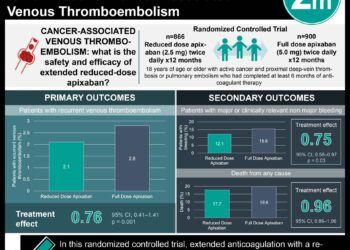Less frequent mammography is non-inferior to annual screening for breast cancer survival in women after curative treatment
1. 5-year breast cancer-specific survival was comparable between annual and less frequent mammography groups.
2. Less-frequent mammographic surveillance showed a similar recurrence-free interval.
Evidence Rating Level: 1 (Excellent)
Study Rundown: Breast cancer surveillance guidelines vary worldwide, with uncertainty regarding the necessity of annual mammograms for survivors. Determining whether less frequent mammography provides comparable survival outcomes could help optimize patient post-treatment care and reduce healthcare-related costs. This randomized controlled trial aimed to assess whether biennial mammograms after breast-conserving surgery or triennial mammograms after mastectomy were non-inferior to annual mammograms for breast cancer-specific survival. The primary outcome of this study was breast cancer-specific survival, while a key secondary outcome was the recurrence-free interval. According to study results, less frequent mammography was non-inferior to annual mammography for breast cancer-specific survival, recurrence-free interval, and overall survival. Although this study was well done, it was limited by a relatively short follow-up period, which may not fully capture long-term recurrence and survival trends.
Click to read the study in The Lancet
Relevant Reading: Effect of Three Decades of Screening Mammography on Breast-Cancer Incidence
In-depth [randomized controlled trial]: Between Apr 22, 2014, and Sept 28, 2018, 23776 women were assessed for eligibility across 114 National Health Service hospitals in the UK. Included were patients ≥ 50 years with invasive or non-invasive breast cancer and recurrence-free ≥ 3 years after curative surgery. Altogether, 5235 patients (2618 to annual screening and 2617 to less frequent screening) were included in the final analysis. The primary outcome of 5-year breast cancer-specific survival was comparable in the annual mammography and less frequent mammography groups (98.1% vs. 98.3%, hazard ratio [HR] 0.92, 95% confidence interval [CI] 0.64-1.32, p<0.0001). The secondary outcome of recurrence-free interval and overall survival also showed comparable results between the two groups (94.1% vs. 94.5% and 94.7% vs. 94.5%, respectively). Findings from this study suggest that less frequent mammographic surveillance may be a viable alternative for breast cancer survivors above age 50.
Image: PD
©2025 2 Minute Medicine, Inc. All rights reserved. No works may be reproduced without expressed written consent from 2 Minute Medicine, Inc. Inquire about licensing here. No article should be construed as medical advice and is not intended as such by the authors or by 2 Minute Medicine, Inc.







